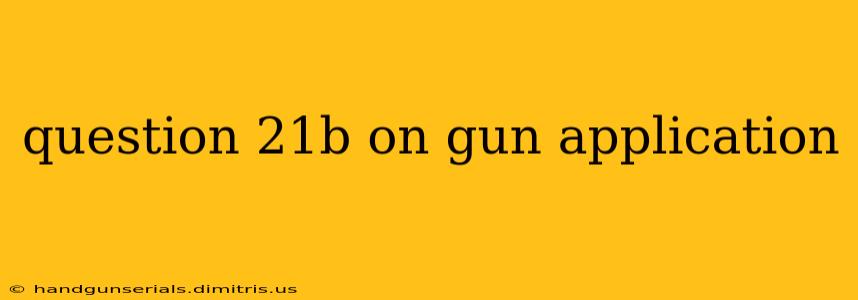Decoding Question 21b on Gun Application Forms: A Comprehensive Guide
Applying for a firearm can feel overwhelming, especially when faced with complex questions like 21b on various application forms. This question, while seemingly straightforward, often requires a nuanced understanding of legal definitions and personal circumstances. This guide aims to clarify what question 21b typically entails and how to answer it accurately and completely. Remember, providing false information on a firearms application carries serious legal consequences.
Understanding the Variation in Question 21b
The exact wording of question 21b can vary slightly depending on the specific jurisdiction and application form. However, the core question generally revolves around a history of mental health issues and involuntary commitments. It often asks whether you've ever been:
- Adjudicated mentally defective: This refers to a legal finding by a court that you are mentally incompetent or incapable of managing your own affairs.
- Committed to a mental institution: This involves involuntary hospitalization or confinement in a mental health facility.
- Found by a court to be a danger to yourself or others: This pertains to situations where a court has determined you pose a risk to your safety or the safety of others due to mental health concerns.
What the Question Really Wants to Know
Question 21b is designed to assess your suitability to possess a firearm. The underlying concern is whether your mental health history presents a potential risk to public safety. The focus is on legal adjudications and involuntary commitments, not simply a diagnosis or history of mental health treatment. Seeking professional help for mental health issues is not, in itself, a disqualifying factor.
How to Answer Question 21b Accurately
- Be Honest and Thorough: Complete honesty is crucial. Omitting relevant information can lead to application denial and potential legal repercussions.
- Understand the Legal Definitions: Ensure you understand the specific legal terminology used in the question. If unsure, consult with a legal professional familiar with firearms regulations in your jurisdiction.
- Consult Records: Review your medical and legal records to accurately recall any relevant adjudications or involuntary commitments.
- Seek Professional Advice: If you have any doubts or concerns about how to answer, seek guidance from a lawyer specializing in firearms law. They can help you interpret the question and ensure your response is accurate and legally sound.
- Provide Specific Details: If you answer "yes," provide specific details, such as the date, location, and court or institution involved. Avoid vague or generalized responses.
The Importance of Accuracy
Providing accurate and complete information on your gun application is paramount. False statements are a serious offense and can result in significant penalties, including:
- Application Denial: Your application will likely be rejected.
- Criminal Charges: You could face criminal charges for providing false information on a government document.
- Loss of Firearms Rights: You may permanently lose your right to own firearms.
Conclusion
Question 21b on gun applications requires careful consideration and accurate responses. Understanding the legal definitions and seeking professional advice when necessary can ensure you complete the application process correctly and legally. Remember, responsible gun ownership includes understanding and complying with all applicable laws and regulations.

